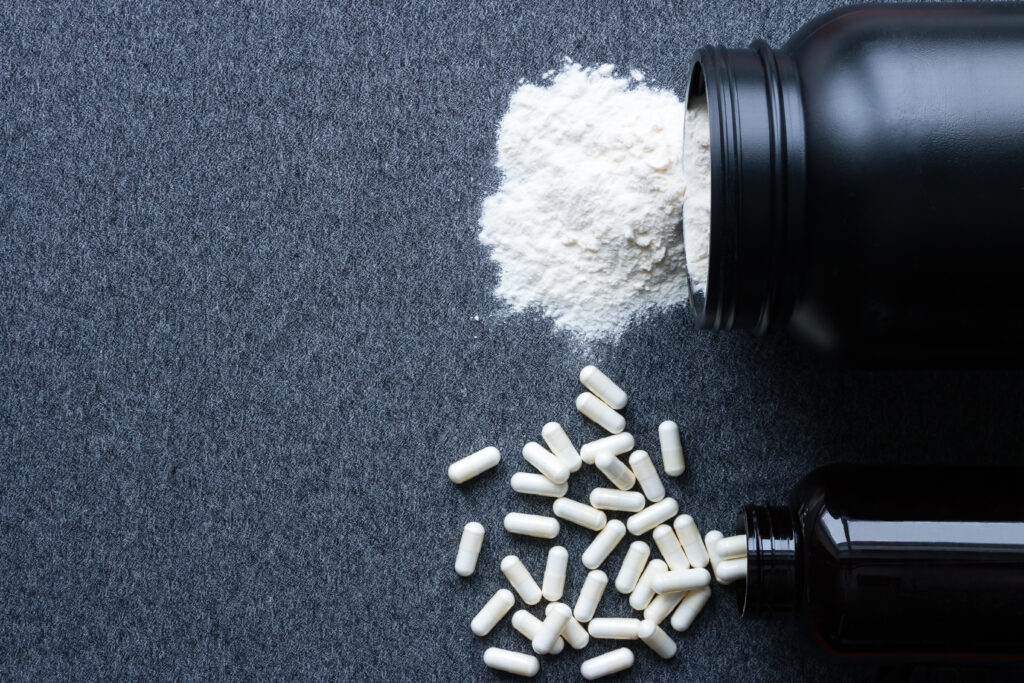Creatine Hydrochloride (HCL) vs Monohydrate: Which is Better and Why?

Creatine supplements are popular among athletes, bodybuilders, and fitness enthusiasts alike. While there are many different forms of creatine supplements on the market. Two of the most common types are creatine HCL vs monohydrate.
Both have their advantages and disadvantages, but which one should you choose? In this article, we will compare creatine HCL vs monohydrate to help you decide which creatine is best for your needs. We’ll discuss the differences between them in terms of absorption rate, cost-effectiveness, convenience, safety profile, and more so that you can make an informed decision about which creatine supplements are best for you.
What is Creatine?
Creatine is a type of amino acid that plays an important role in muscle growth sports nutrition and development. Creatine is made naturally in our bodies. We can also take it as a dietary supplement to increase lean muscle mass, strength, and endurance.
Creatine monohydrate is the most popular form of creatine on the market, while creatine HCL has become increasingly popular.
How does creatine work?
The creatine molecule is composed of three amino acids: arginine, glycine, and methionine. It plays an essential role in energy metabolism. By providing the body with phosphocreatine, which acts as a high-energy storage molecule.
When combined with adenosine triphosphate (ATP), creatine provides cells with ATP quickly and efficiently during short bursts of intense physical activity such as weightlifting or sprinting.
This allows muscles to contract more forcefully and for longer periods of time, resulting in improved performance during exercise.
Additionally, the creatine molecule helps increase muscle size by promoting protein synthesis and reducing protein breakdown in the body.
Comparison between Creatine Hydrochloride vs Monohydrate
Creatine HCL vs monohydrate both have their advantages, but there are some key differences between them.
Creatine monohydrate is the most cost-effective form of supplement creatine, being more affordable than creatine hydrochloride HCL. It is also the most widely studied form of creatine, with a long history of safety and efficacy. However, creatine monohydrate has a lower absorption rate than creatine HCL.
It may not be as effective for those looking to maximize their gains.
What is Creatine monohydrate?
Creatine monohydrate supplementation is popular among athletes, bodybuilders, and fitness enthusiasts alike.
It is composed of three amino acids – arginine, glycine, and methionine – and it plays an important role in muscle growth and development.
Creatine monohydrate is naturally produced by the body. It can also be taken as a supplement to increase muscle mass, strength, and endurance. It is one of the most cost-effective forms of creatine and has a long history of safety and efficacy.
What is Creatine HCL?
Creatine Hydrochloride (HCL) is a form of the amino acid creatine that is found naturally in the body. It is often used as a dietary supplement to increase muscle mass, strength, and endurance.
Creatine HCL is formed when creatine monohydrate is combined with hydrochloric acid. Resulting in a more concentrated form of creatine that is more quickly and easily absorbed by the body.
This higher absorption rate makes it a better choice as a pre-workout. For those looking to maximize their gains from creatine supplementation.
Additionally, creatine HCL is more cost-effective over the long term than monohydrate. Since you need to take less in order to get the same results.
Creatine HCL is more expensive than creatine monohydrate but has a higher absorption rate. Which means it can be more effective for athletes and bodybuilders looking to increase their strength and muscle mass.
It is also convenient to take as it only requires smaller doses compared to monohydrate.
Additionally, due to its higher solubility, it can dissolve faster in water or other pre-workout liquids making it easier to ingest.
In terms of safety , both forms of creatine have been extensively studied and found safe when used according to recommended dosages.
That said, individuals who suffer from pre-existing medical conditions should consult with their doctor before taking any dietary supplements including creatine.
Overall, both forms of creatine offer certain benefits depending on what your goals are and what type of lifestyle you lead. Talk to your doctor or trainer about which one might be best for you.
Creatine HCL vs monohydrate are the two most popular forms of creatine supplementation. Both have their advantages and disadvantages, but which one should you choose?
Let’s compare these two forms side-by-side to help you decide which one is best for your needs.
Water retention and weight gain
When it comes to absorption rates, creatine monohydrate has a lower bioavailability than creatine hydrochloride due to its larger size.
This means creatine monohydrate will take longer for the body to break down and absorb it into the bloodstream. Making it better for a pre workout option.
It makes it a better choice for those looking to increase their strength and muscle mass in a shorter period.
Creatine monohydrate vs creatine HCL can cause water retention. Which means you may experience some temporary weight gain due to increased muscle size.
Absorption and solubility
Creatine monohydrate is not as easily absorbed by the body. Meaning that you need more in order to achieve the desired effects.
On the other hand, creatine HCL is more quickly and easily absorbed to your muscle cells. Making it more water soluble and effective for those looking to maximize their gains from supplementation. According to food and nutrition research supplemental creatine HCL can dissolve faster in water or other liquids making it easier to ingest.
Cost-Effectiveness
When it comes to cost comparison, creatine monohydrate is more affordable than creatine HCL. While both forms of creatine can be effective in helping athletes and bodybuilders maximize muscle mass and strength, the cost-effectiveness of each will depend on individual needs and goals. Creatine monohydrate is the most cost-effective form available, while creatine HCL may be slightly more expensive but could offer a higher absorption rate for those looking to maximize their gains.
In terms of cost-effectiveness, both creatine HCL and monohydrate can be quite expensive depending on where you purchase from. However, when compared directly, there is usually a slight difference in favor of creatine monohydrate since it tends to be a bit cheaper than its counterpart. You can also find it in some pre workout supplements if you really want the best bang for your buck. That being said, cost should not be the only factor when when you decide between these two supplements. Creatine supplementation in pre workout drinks is becoming popular especially with creatine HCL because of its solubility factor.
Convenience
When it comes to convenience, you can easily take creatine HCL vs monohydrate with food or mixed into a beverage for consumption. However, creatine monohydrate tends to be slightly more convenient due to its powder form. Which makes it easier to mix into other foods and drinks. On the other hand, some users may find that taking tablets or capsules of creatine HCL vs monohydrate is more convenient. Since they don’t require any preparation ahead of time like mixing powders do.
Safety Profile
In terms of safety profile, both creatine HCL vs monohydrate tends to have similar safety profiles with no major differences between them. That being said, some individuals may experience minor side effects such as bloating or nausea when you take either creatine HCL vs monohydrate supplementation, but this can usually be avoided by following recommended dosage instructions and drinking plenty of fluids while consuming them.
Overall Benefits & Effects
The main benefit of creatine HCL vs monohydrate is improving lean body mass and strength gains due to increased levels of ATP (adenosine triphosphate creatine HCL) in muscle cells. In addition, regular use of both creatine HCL vs monohydrate is linked to increased muscle mass,increased energy levels during physical activities such as weight training or endurance exercises like running or cycling. Furthermore, studies have also suggested that regular use of creatine monohydrate and creatine HCL may lead to improved cognitive functions such as focus and memory recall although further research is needed in this area before any concrete conclusions can be made about its efficacy in this regard.
Frequently asked questions?
What is the recommended dose for creatine HCL vs monohydrate?
Creatine HCL and Creatine Monohydrate are both forms of creatine that can help athletes and bodybuilders with muscle strength and growth. It is important to take the correct amount of each type so that you get the best results. The recommended dose for creatine HCL is 2-4 grams per day, while for creatine monohydrate it is 3-5 grams per day. Make sure to always follow the directions on the label when taking either supplement.
How should I take creatine?
To get the most out of your creatine supplement, it is important to understand how to take it properly. Creatine monohydrate vs creatine HCL is typically taken at the same dosage of 3-5 grams per day or 2-4 for creatine HCL. We recommended that you take these products with food or a beverage to maximize absorption and utilization. For creatine HCL, you normally take it in a pill form.
30 minutes before as a pre-workout.
Is there a loading phase with creatine HCL vs monohydrate?
When it comes to taking creatine, there is often a misconception that a loading phase must be done in order to experience the full benefits of the supplement. However, this isn’t necessarily true as both creatine HCL vs monohydrate can provide adequate muscle and strength gains without having to take large doses in the beginning.
In Conclusion
Both forms Creatine HCL vs monohydrate offer benefits and effects related to muscle growth and performance enhancement however whether one offers superior benefits over the other remains inconclusive at this point so ultimately the decision between which form to choose rests solely on personal preference and individual needs/goals related to fitness pursuits
Final note
Based on all the scientific data between creatine HCL vs monohydrate- We pick monohydrate. It is the safe, affordable, and most effective type of creatine available in the sports nutrition market.
Many research studies have supported the effectiveness of taking creatine monohydrate in improving your athletic performance, muscle strength and lean body mass.
Creatine HCL lacks evidence in this regard. It is also more expensive compared to creatine monohydrate. Although the effects of creatine HCL vs monohydrate is promising, we just need more research studies to prove these benefits.
